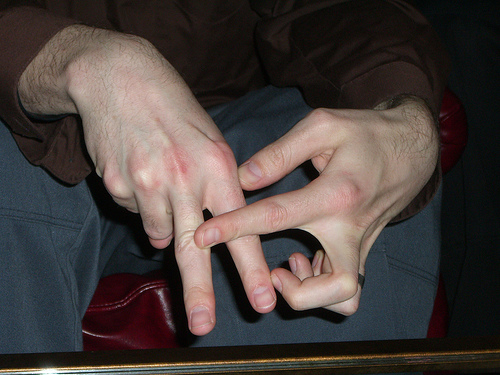 Â August 9, 2009 Â August 9, 2009
Â
Woman duped by middle-age man who acted like a child
BY REBECCA BASU
FLORIDA TODAY Janet Schulte believed the man when he told her by phone that his 40-something, disabled brother needed a caregiver who could bottle-feed him and change his diapers.What the Melbourne woman can’t believe is that he committed no crime, now that she said she has found out the situation was a charade: that the man and his brother were same person.And that he didn’t have the disabilities he claimed to have.”I feel violated,” Schulte said, sharing her story because she said the man has deceived other women and will try again. “I feel disgusted.”Investigators and prosecutors have refused to pursue charges, saying Schulte was paid and agreed to provide the care.FLORIDA TODAY is not identifying him because he is not being charged.”I consented to change his diapers, but I legitimately thought this man needed help,” she said. “How can that not be a crime for him to come into my house and expose himself?”Sgt. David Marich, head of general crimes for the North Precinct of the Brevard County Sheriff’s Office, brought Schulte’s case to the State Attorney’s Office.When prosecutors said there wasn’t enough evidence, Marich said his office did more research to try to find some statute that was violated.
“It’s a weird case,” Sheriff’s Lt. Tod Goodyear said. “It’s really on a borderline of possibly being a fraud. He is perpetrating something there because he’s doing it under a false pretense.”
FLORIDA TODAY tried several times to reach the man at his Port St. John home and on a cell phone. He did not answer the door or the phone.
How It Started
The deception began, Schulte said, when she placed an ad online on Craigslist.org offering child care services.
She said a man called and asked Schulte if she knew any special-needs caregivers.
And, she said, his story went on.
The man told Schulte that a car accident left his brother with physical disabilities, including weak arms, poor bladder control and the mental capacity of a 5-year-old.
He told her how an aunt and current caregiver had no patience. He offered Schulte $600 a week to look after his brother.
The man insisted that his brother could come to Schulte’s house by himself because the aunt lived nearby and he knew the neighborhood.
Schulte said “the brother” spent his days at her house watching cartoons and playing video games.
“I took care of him just like I would my kids,” she said. “I rubbed his head when he was falling asleep. I waited on him hand and foot.”
In the three months Schulte provided care, she said the man never slipped out of character.
“The guy played such a good role,” whether pretending to be the brother or the man who hired her.
“Brother” not seen.
Schulte said the man who hired her always had an explanation for any red flags. She tried to meet him in person, but their plans always fell through. But that seemed normal, given their competing schedules.
Schulte and her husband, Dominic Randall, talked to him often by phone.
Then Schulte said her husband noticed subtle changes in “the brother’s” behavior, and payment to his wife was erratic.
Schulte said Randall followed him one day when he left their home: Instead of walking to his aunt’s house, he got into a parked car two blocks away and drove off.
Her husband followed the man to his home and confronted him, she said, and sheriff’s deputies came.
According to a sheriff’s report, the man admitted to the deception and blamed post-traumatic stress disorder, without further explanation.
Schulte said his behavior was never sexual in nature. She briefly posted a warning on Craigslist, and she said five women wrote to her, saying they had nearly been taken in by the scam.
Some suggested that it might be an “adult baby” or “diaper-lover” fetish. Often, people with such fetishes want to be treated as babies and talk in barely audible voices, as the man did.
Advice on fraud.
Ross Wolf, a criminal justice professor at the University of Central Florida, said the man obtained services fraudulently, but he paid for them.
“It’s the opposite of what fraud statutes are set up to criminalize,” he said. The laws seek to prosecute people who get money, goods or services with deception and don’t reciprocate fairly.
“There is not a law for everything that we might consider improper or criminal in nature,” Wolf said. “I think it’s unfortunate that things like this happen to people where we don’t have legislation, but we do have an imperfect system of justice, and it’s constantly under revision.”
Schulte can go the civil suit route, Wolf said, especially because she didn’t get her full pay. And Melbourne police have reopened the case, investigating whether the man used another person’s credit card illegally when he paid Schulte.
But neither would likely get Schulte what she wants: a conviction and jail time for the man she says took advantage of her in a humiliating way.
“This is not going to stop unless somebody really does something about this,” she said.
Additional Facts
What could Schulte do?The following tips might have helped Janet Schulte protect herself against the deception she describes:
If you’re inexperienced in the service you’re providing, consult with someone knowledgeable. Although Schulte took a course about caring for people with special needs, she never had cared for an adult with this condition.
Ask the person for his full name, address and telephone number (not mobile). Check that information using the phone book, voter records or online searches.
Don’t rely on phone calls to develop a rapport or a relationship with someone. Meet in person at a public place.
Ask to review a doctor’s orders or some documents that show a person’s needs.Â
|


